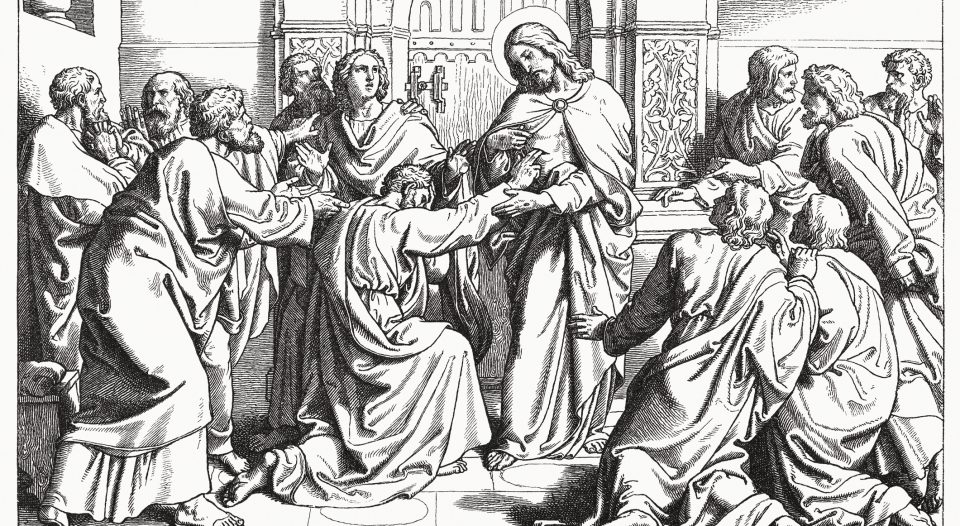Lectionary for April 16, 2023
Second Sunday of Easter
Acts 2:14a, 22-32; Psalm 16;
1 Peter 1:3-9; John 20:19-31
I’m not the most dogmatic pastor. I love listening to folks with all kinds of different positions and have been enriched immeasurably when people tell me that I’m wrong about all sorts of things (and then proving it to me!). But one thing I insist on—and the line of the creeds that I assert most firmly—is that I believe in the resurrection of the dead.
Jesus’ resurrection about 2,000 years ago and our eventual resurrection at the fullness of all things is some of the best news we’ve got. Jesus didn’t just win a victory over sin, but also over death—in all of its “deathiness.” Bodies come back in ways that are decay-proof and invulnerable to sickness. The witness of the early church insists that Jesus’ victory over death is complete, while we still wait for the fullest implications of that victory.
In his Pentecost speech to the Jews who assembled in Jerusalem for the pilgrimage festival, Peter preached forcefully about Jesus’ resurrection. He spoke about works of power, wonders and signs that testify to Jesus’ identity. What is the identity that Peter is discussing here? This isn’t advanced Christology, arguing something about Jesus in relation to God the Father. That will come later. What Peter wants the people to know is that Jesus was a man who was murdered by pagan Romans in collaboration with some of the Jewish ruling council. Jesus died.
But, citing the words of Psalm 16, Peter insisted that God wouldn’t allow God’s holy one to see decay or abandon him to the grave, therefore, the holy one’s body will rest in hope. Peter reasoned that David died and stayed dead. His grave was known to the first-century Jewish community. So David could not be speaking of himself. Instead, he was prophesying about one of his descendants. Peter insisted that these words were about Jesus, who Peter and the disciples witnessed as raised from the dead. Next week we will read about Peter insisting that God made Jesus Lord and Messiah. But before that, Peter’s first concern is that everyone knows that Jesus had been killed and bodily resurrected.
Thomas … had to know for certain that Jesus’ resurrection was not a myth or an ideal but an embodied reality that provides hope for victory over death.
Peter and Luke, the probable author of Acts, weren’t alone in their insistence on bodily resurrection. In John’s Gospel, Jesus appeared to his disciples specifically to show them his resurrected body, among other reasons. Jesus used his resurrected lungs to breathe upon them and give them the Spirit. What does resurrected breath smell like? Probably grilled fish if the other resurrection stories mean anything.
A little over a week later, Jesus returned to his disciples. Thomas had been away from the other disciples and didn’t believe their tales about Jesus’ bodily resurrection. Jesus showed up again to let Thomas touch him, inspect his fatal wounds and confirm that he had, in fact, died and was resurrected again. Why? What if some of the disciples thought that Jesus had only conquered the idea of death, so that we need not fear the end even though there was no bodily reality after death? No, the point of Jesus’ resurrection is that it was a foretaste of the general resurrection. Jesus is raised from the dead, in body and soul, and he vouchsafes that promise for us as well. Thomas, as a profoundly faithful apostle to the Parthian Empire and then the Indian subcontinent, had to know for certain that Jesus’ resurrection was not a myth or an ideal but an embodied reality that provides hope for victory over death.
The season of Resurrection means more to me each year, as more beloved family and friends go on to wait for the resurrection. I believe my Grandpa Driver will again clap me on the back. I believe that Grandma Driver will smile at me. And I believe that Grandma LeMay will lift her glass in cheers to me at the great feast in the world to come, as she always raised her communion glass (much to the chagrin of several ministers over the years). But if you can’t “cheers” the cup of salvation with the blood of the new covenant of the crucified and resurrected Jesus, what on earth is worth “cheers-ing”?
The good news of resurrection is a bedrock claim of Christianity. Jesus’ victory over sin and death is a bodily victory. God will not abandon any of God’s saints to death and decay but will work resurrection for all. Jesus is the first fruits of the dead (1 Corinthians 15:20)!




